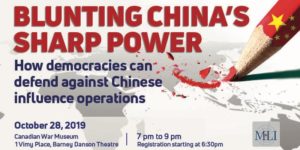
The Chinese Communist worker. Pop art retro vector Credit: CSP
Using Taiwan’s most recent elections as an example to elucidate the nature of Chinese
propaganda and disinformation, a new report identifies China’s motives, tactics, and actors
in its foreign information warfare. Similar to Russia’s, China’s motives are to destabilize
democracy and weaken governance in a target country by sowing doubts and chaos in
its society, undermining its self-confidence, and increasing polarization and disunity, Aaron Huang writes in Combatting and Defeating Chinese Propaganda and Disinformation: A Case Study of Taiwan’s 2020 Elections.

National Endowment for Democracy (NED)
Coined by the National Endowment of Democracy, sharp power is a country’s asymmetric ability to perforate the target country’s political and informational ecosystems, employing the following tactics, he adds:
1) worsen existing social, political, economic, and generational divides;
2) exploit weaknesses in the informational system;
3) financially control and absorb traditional media;
4) employ its cyber army;
5) obfuscate the attack source through technological, commercial, and legal means; and
6) make the attacks partisan so that one side will at worst not condemn it and at best magnify the effects of its attacks.
 Drawing on Taiwan’s success, the author suggests the policy recommendations below for the US State Department’s Global Engagement Center (GEC), ordered by the level of importance (least [1] to most [12]) and implementation ease (easiest [1] to hardest [12]):
Drawing on Taiwan’s success, the author suggests the policy recommendations below for the US State Department’s Global Engagement Center (GEC), ordered by the level of importance (least [1] to most [12]) and implementation ease (easiest [1] to hardest [12]):
1. Create a database of propaganda and disinformation experts from around the
world and track their research findings.
2. Cooperate with the State Department’s special envoy on countering China’s UN influence to understand and combat Chinese efforts to use propaganda and disinformation to reshape international norms and values.
3. Draw from the Taiwanese government’s debunking strategy to create a State Department standard operating procedure (SOP) for responding to foreign propaganda and disinformation.
4. Conduct “combatting foreign propaganda and disinformation” workshops with
Public Affairs Bureau officers so they can react quickly and efficiently when attacks occur.
5. Require each diplomatic mission to submit an SOP for responding to propaganda
and disinformation against the US in its host country for the GEC’s approval.
6. Add monitoring and reporting on Chinese propaganda and disinformation operations globally to the State Department’s regional China watchers’ portfolio……. RTWT







